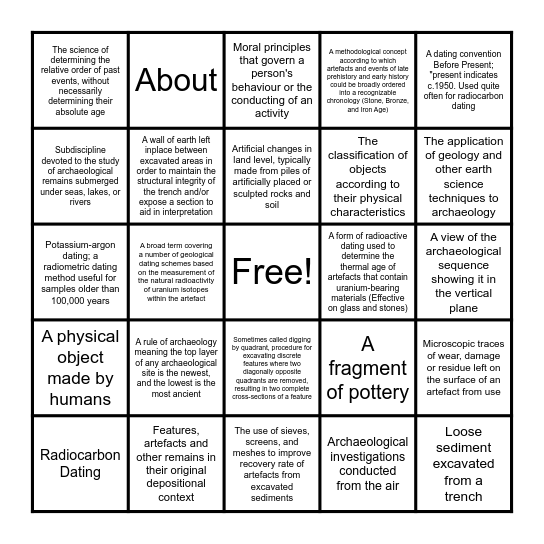

This bingo card has a free space and 34 words: Ascertaining the age of an object with reference to a fixed and specific time scale, Archaeological investigations conducted from the air, A Person engaged in the study of archaeology, The academic Discipline concerned with the study of the human past through material remains, A physical object made by humans, A wall of earth left inplace between excavated areas in order to maintain the structural integrity of the trench and/or expose a section to aid in interpretation, A dating convention Before Present; "present indicates c.1950. Used quite often for radiocarbon dating, Radiocarbon Dating, About, Information relating to where an artefact or feature was found and what it was found in association with, Artificial changes in land level, typically made from piles of artificially placed or sculpted rocks and soil, Moral principles that govern a person's behaviour or the conducting of an activity, Exposure, processing and recording of archaeological remains, Archaeological investigations taking place in the field, A form of radioactive dating used to determine the thermal age of artefacts that contain uranium-bearing materials (Effective on glass and stones), The application of geology and other earth science techniques to archaeology, Features, artefacts and other remains in their original depositional context, Potassium-argon dating; a radiometric dating method useful for samples older than 100,000 years, A rule of archaeology meaning the top layer of any archaeological site is the newest, and the lowest is the most ancient, A fragment of pottery, Sometimes called digging by quadrant, procedure for excavating discrete features where two diagonally opposite quadrants are removed, resulting in two complete cross-sections of a feature, Absolute dating technique used to determine the age of organic materials less than 50,000 Years old. Age is determined by examining the loss of unstable carbon-14 isotope, which is absorbed by all living organisms during their lifespan, The science of determining the relative order of past events, without necessarily determining their absolute age, A view of the archaeological sequence showing it in the vertical plane, The use of sieves, screens, and meshes to improve recovery rate of artefacts from excavated sediments, Loose sediment excavated from a trench, A methodological concept according to which artefacts and events of late prehistory and early history could be broadly ordered into a recognizable chronology (Stone, Bronze, and Iron Age), A method of archaeological evaluation used to estimate the archaeological potential of a site, The classification of objects according to their physical characteristics, Subdiscipline devoted to the study of archaeological remains submerged under seas, lakes, or rivers, Pottery vessel in which cremated remains were placed for interment, A broad term covering a number of geological dating schemes based on the measurement of the natural radioactivity of uranium isotopes within the artefact, Microscopic traces of wear, damage or residue left on the surface of an artefact from use and Subdiscipline devoted to the analysis of animal remains in the archaeological record.
Archaeology Bingo | Dating Methods - Anthro 1 | hunter-gatherer BING | hunters and gatherers | Hunters and Gatherers
Share this URL with your players:
For more control of your online game, create a clone of this card first.
Learn how to conduct a bingo game.
With players vying for a you'll have to call about __ items before someone wins. There's a __% chance that a lucky player would win after calling __ items.
Tip: If you want your game to last longer (on average), add more unique words/images to it.